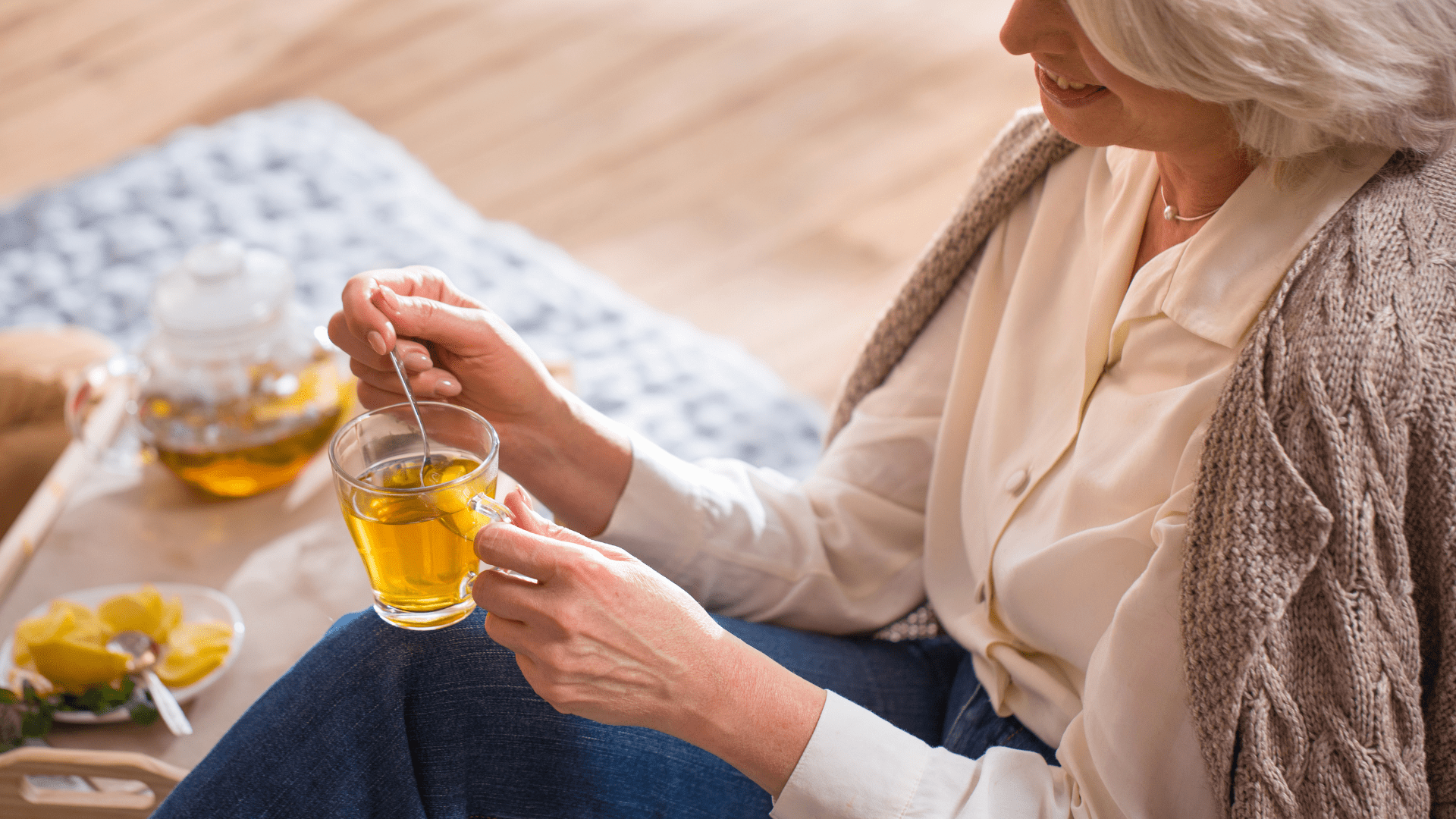We’re heading into the season of weather changes and holiday stress, the perfect storm for not feeling so great. These changes can contribute to chronic stress which can lead to the development of such diseases as insulin resistance, hyperlipidemia, cardiovascular disease, and hypertension.
In observance of this shift of season, let’s chill out with an afternoon tea break. Why a tea break? Well, making and sipping a cup of tea helps induce the relaxation response in two ways: in your mind and in your body. Research by psychologist Dr. Malcolm Cross, of City University London, has shown, that 60% of people primarily “seek solace in a calming cup of tea” for the promise of comfort and warmth provided and 41% do so as a means of psychological escape (Cross & Michaels, 2009). As David Hoffmann, a fellow of Britain’s prestigious National Institute of Medical Herbalists, points out, “it’s easier for the psyche to relax when the body is at ease” (Hoffmann, 2000, p. 30).
“Relaxation: the state of being free from tension and anxiety; recreation or rest, especially after a period of work (Google Search, n.d.)”
Herbal teas for a calming effect include the adaptogens and the nervine relaxants. Adaptogens increase resilience and resistance to stress by supporting the adrenal glands, the endocrine organ responsible for turning on and off the physiological stress response (Hoffmann, 2000, p. 16). Common herbs that fall within the adaptogen category include tulsi or holy basil (Ocimum sanctum) and Chinese ginseng (Panax ginseng) (Chevallier, 2000). These plants exert a normalizing influence on the body, perking you up when you need energy and calming you down when your body is overstimulated (Wallace, n.d.).
Nervine relaxants help ease anxiety and have a calming effect on the nervous system, especially during times of stress. The following common nervine herbs have a mild relaxing effect on the body, soothing without sedating: chamomile, lavender, and lemon balm. Studies have demonstrated that merely smelling lavender can reduce anxiety and induce calm in one of the most stress-promoting situations out there, waiting for your dentist appointment (Forêt, 2017, p. 109)! Researchers from the College of Public Health Sciences, Chulalongkorn University, Bangkok, Thailand, found that inhalation of lavender decreased stimulation of the autonomic nervous system (ANS) as evidenced by a significant decrease of blood pressure, heart rate, and skin temperature (Sayorwan et al., 2012).
So, who knew that an unassuming little cup of tea held such a wealth of relaxation and health benefits! Well, it’s time for me to brew a cup of tulsi tea for myself and enjoy a bit of #digitaldowntime with my coloring pages.
What will you do for your tea break and what will you recommend to your clients? Please share your ideas in the comments section.
References
Chevallier, A. (2000). The encyclopedia of herbal medicine. New York: A Dorling Kindersley Book.
Cross, M., & Michaels, R. (2009). The social psychological effects of tea consumption on stress (Executive Summary). City University London.
Forêt, R. de la. (2017). Alchemy of herbs: transform everyday ingredients into foods & remedies that heal. Carlsbad, California: Hay House, Inc.
Google Search. (n.d.). Dictionary – Relaxation. Retrieved August 15, 2018, from https://www.google.com/search?rlz=1C1CHBF_enUS731US733&q=Dictionary#dobs=relaxation
Guilliams, T. G., & Edwards, L. (2010). Chronic stress and the HPA axis: Clinical assessment and therapeutic considerations. The Standard, 9(2), 1–12.
Hoffmann, D. (2000). Healthy digestion: a natural approach to relieving indigestion, gas, heartburn, constipation, colitis, and more. Pownal, Vt: Storey Books.
Levine, D. S. (2017, August 15). National Relaxation Day 2017: 5 Fast Facts You Need to Know | Heavy.com. Retrieved August 15, 2018, from https://heavy.com/news/2017/08/national-relaxation-day-2017-facts-origin-date-ideas/
Sayorwan, W., Siripornpanich, V., Piriyapunyaporn, T., Hongratanaworakit, T., Kotchabhakdi, N., & Ruangrungsi, N. (2012). The effects of lavender oil inhalation on emotional states, autonomic nervous system, and brain electrical activity. Journal of the Medical Association of Thailand = Chotmaihet Thangphaet, 95(4), 598–606.
Wallace, E. C. (n.d.). Adaptogenic Herbs. Retrieved August 15, 2018, from http://www.chiro.org/nutrition/FULL/Adaptogenic_Herbs.shtml

